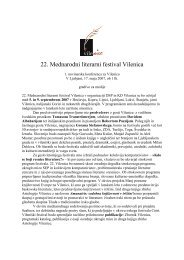- Page 4 and 5:
26. Mednarodni literarni festival V
- Page 7 and 8:
Nagrajenec Vilenice 2011 Vilenica 2
- Page 9 and 10:
Mircea Cărtărescu se je rodil let
- Page 11 and 12:
Izbrana bibliografija Mircea Cărt
- Page 13 and 14:
Mircea Cărtărescu was born in 195
- Page 15 and 16:
Selected Prizes and Awards Mircea C
- Page 17 and 18:
Mircea Cărtărescu · 15 Audiobook
- Page 19 and 20:
Mircea Cărtărescu · 17 dneva, ma
- Page 21 and 22:
Mircea Cărtărescu The Vilenica 20
- Page 23 and 24:
Mircea Cărtărescu · 21 the prota
- Page 25 and 26:
Orbitor (fragment) Mircea Cărtăre
- Page 27 and 28:
Mircea Cărtărescu · 25 sfârșea
- Page 29 and 30:
Mircea Cărtărescu · 27 niso bili
- Page 31 and 32:
Orbitor (Excerpt) Mircea Cărtăres
- Page 33 and 34:
Mircea Cărtărescu · 31 aslant in
- Page 35 and 36:
Mircea Cărtărescu · 33 eram omul
- Page 37 and 38:
... mese minunate în restaurante c
- Page 39 and 40:
Mircea Cărtărescu · 37 bil sem
- Page 41 and 42:
... The Art Institute (sami impresi
- Page 43 and 44:
I was the black-and-white man in a
- Page 45:
… the Art Institute (impressionis
- Page 48 and 49:
Pavel Brycz Foto © Jiří Jiroutek
- Page 50 and 51:
48 · Pavel Brycz Svatý démon leg
- Page 52 and 53:
50 · Pavel Brycz které zvonilo po
- Page 54 and 55:
52 · Pavel Brycz Sveti demon legen
- Page 56 and 57:
54 · Pavel Brycz njegove mišice s
- Page 58 and 59:
56 · Pavel Brycz The Holy Demon Le
- Page 60 and 61:
58 · Pavel Brycz I saw treasures i
- Page 62 and 63:
Pierluigi Cappello Foto © Danilo D
- Page 64 and 65:
62 · Pierluigi Cappello Mandate a
- Page 66 and 67:
64 · Pierluigi Cappello Ritornare
- Page 68 and 69:
66 · Pierluigi Cappello Oznanite s
- Page 70 and 71:
68 · Pierluigi Cappello Vračanje
- Page 72 and 73:
70 · Pierluigi Cappello Make it kn
- Page 74 and 75:
72 · Pierluigi Cappello Coming bac
- Page 76 and 77:
Dan Coman
- Page 78 and 79:
76 · Dan Coman noile dimineţi de
- Page 80 and 81:
78 · Dan Coman poem de dragoste pe
- Page 82 and 83:
80 · Dan Coman rînd pe rînd feme
- Page 84 and 85:
82 · Dan Coman chicco vsako jutro
- Page 86 and 87:
84 · Dan Coman soba devet otročni
- Page 88 and 89:
86 · Dan Coman new mornings severa
- Page 90 and 91:
88 · Dan Coman love poem all day i
- Page 92:
90 · Dan Coman it’s late now, be
- Page 95 and 96:
Ivan Dobnik se je rodil leta 1960 v
- Page 97 and 98:
Ivan Dobnik · 95 tebe na poletni m
- Page 99 and 100:
* * * Mogoče se ne srečava nikoli
- Page 101 and 102:
Whether among the lights? Whether a
- Page 103 and 104:
Maybe * * * Ivan Dobnik · 101 All
- Page 105 and 106:
* * * Ivan Dobnik · 103 Maybe, lik
- Page 107 and 108:
György Dragomán se je rodil leta
- Page 109 and 110:
György Dragomán · 107 itt a hat
- Page 111 and 112:
Tovor György Dragomán · 109 Zeus
- Page 113 and 114:
György Dragomán · 111 zgodilo, i
- Page 115 and 116:
György Dragomán · 113 by chance
- Page 117 and 118:
György Dragomán · 115 Zeus put t
- Page 119 and 120:
Stanka Hrastelj se je rodila leta 1
- Page 121 and 122:
Stanka Hrastelj · 119 Gleda ga po
- Page 123 and 124:
On/Off Stanka Hrastelj · 121 This
- Page 125 and 126:
Stanka Hrastelj · 123 of a sudden
- Page 127 and 128:
Ljiljana Jokić Kaspar se je rodila
- Page 129 and 130:
* Ljiljana Jokić Kaspar · 127 - G
- Page 131 and 132:
Ljiljana Jokić Kaspar · 129 Ljuba
- Page 133 and 134:
* Ljiljana Jokić Kaspar · 131 - G
- Page 135 and 136:
Ljiljana Jokić Kaspar · 133 valov
- Page 137 and 138:
Four Little Women (Excerpt) Ljiljan
- Page 139 and 140:
Ljiljana Jokić Kaspar · 137 the p
- Page 141 and 142:
Ljiljana Jokić Kaspar · 139 - Tha
- Page 143 and 144:
Gorazd Kocijančič se je rodil let
- Page 145 and 146:
Mysterium magnum I Ko zvečer se sl
- Page 147 and 148:
Prilike o zemeljskem kraljestvu Zem
- Page 149 and 150:
Register und Summarischer Inhalt Zd
- Page 151 and 152:
Mysterium magnum I As you undress a
- Page 153 and 154:
Parables of Earthly Kingdom Earthly
- Page 155 and 156:
Register und Summarischer Inhalt No
- Page 157 and 158:
Vesna Lemaić se je rodila leta 198
- Page 159 and 160:
Vesna Lemaić · 157 »Fatima!« je
- Page 161 and 162:
Vesna Lemaić · 159 Ob pogledu na
- Page 163 and 164:
The Tribal Dance Vesna Lemaić · 1
- Page 165 and 166:
Vesna Lemaić · 163 “Look at Bar
- Page 167 and 168:
Vesna Lemaić · 165 clothes hanger
- Page 169 and 170:
Vladimir Levčev se je rodil leta 1
- Page 171 and 172:
Гларуси Привечер н
- Page 173 and 174:
Кокошката и яйцето
- Page 175 and 176:
Pakiranje To je kartonasta škatla.
- Page 177 and 178:
Begunec 1. Vsaka minuta ima svoja v
- Page 179 and 180:
Most Ismailu Kadareju Tisočletja s
- Page 181 and 182:
Herring Gulls On the beach before d
- Page 183 and 184:
Hen and Egg The hen has hatched goo
- Page 186 and 187:
Nikola Madžirov
- Page 188 and 189:
186 · Nikola Madžirov Не зна
- Page 190 and 191:
188 · Nikola Madžirov Брз е
- Page 192 and 193:
190 · Nikola Madžirov Ne vem Dalj
- Page 194 and 195:
192 · Nikola Madžirov Hitro je st
- Page 196 and 197:
194 · Nikola Madžirov I Don’t K
- Page 198 and 199:
196 · Nikola Madžirov Fast Is the
- Page 200 and 201:
Aleksander Peršolja Foto © Bogdan
- Page 202 and 203:
200 · Aleksander Peršolja V nekem
- Page 204 and 205:
202 · Aleksander Peršolja Pomlad
- Page 206 and 207:
204 · Aleksander Peršolja In a Sp
- Page 208 and 209:
206 · Aleksander Peršolja Spring
- Page 210 and 211:
Edo Popović Foto © Mio Vesović M
- Page 212 and 213:
210 · Edo Popović Oči (ulomak) 1
- Page 214 and 215:
212 · Edo Popović Nikada dotad ni
- Page 216 and 217:
214 · Edo Popović Oči (odlomek)
- Page 218 and 219:
216 · Edo Popović Dotlej nisem bi
- Page 220 and 221:
218 · Edo Popović Eyes (Excerpt)
- Page 222 and 223:
220 · Edo Popović the street your
- Page 224 and 225:
Angelika Reitzer Foto © Peter Köl
- Page 226 and 227:
224 · Angelika Reitzer unter uns (
- Page 228 and 229:
226 · Angelika Reitzer schmerzt ei
- Page 230 and 231:
228 · Angelika Reitzer nekoga, ki
- Page 232 and 233:
230 · Angelika Reitzer among us (E
- Page 234:
232 · Angelika Reitzer he’s pick
- Page 237 and 238:
Tomasz Różycki, sodobni poljski p
- Page 239 and 240:
Cyklon tropikalny Ze wszystkich fil
- Page 241 and 242:
Kawa i tytoń Kiedy zacząłem pis
- Page 243 and 244:
Tropski ciklon Izmed vseh filozofov
- Page 245 and 246:
Kava in tobak Ko sem začenjal pisa
- Page 247 and 248:
Tropical Hurricane Of all philosoph
- Page 249 and 250:
Coffee and Cigarettes When I began
- Page 251 and 252:
Ľubica Somolayová se je rodila le
- Page 253 and 254:
Aeropittura Občas vyprovokujem oko
- Page 255 and 256:
* * * Trénujem realistický príst
- Page 257 and 258:
Aeropittura Včasih izzovem okoliš
- Page 259 and 260:
* * * Vadim realističen pristop do
- Page 261 and 262:
Aeropittura Sometimes I provoke cir
- Page 263 and 264:
* * * I’m practicing the realisti
- Page 265 and 266:
Ognjen Spahić se je rodil leta 197
- Page 267 and 268:
Ognjen Spahić · 265 brkovima, pin
- Page 269 and 270:
Ognjen Spahić · 267 Iznenadila ga
- Page 271 and 272:
Ognjen Spahić · 269 jevimi brki,
- Page 273 and 274:
Ognjen Spahić · 271 Presenetila g
- Page 275 and 276:
Ognjen Spahić · 273 take the pain
- Page 277 and 278:
Ognjen Spahić · 275 in an ashtray
- Page 279 and 280:
Agron Tufa se je rodil leta 1967 v
- Page 281 and 282:
Orfeu Jeta jote - burgosur aq mirë
- Page 283 and 284:
Prova e tokës Gjithë verës viti
- Page 285 and 286:
Orfej Tvoje življenje - tako dobro
- Page 287 and 288:
Dokaz zemlje Poleti je leto imelo d
- Page 289 and 290:
Orpheus Your tears - so well disgui
- Page 291 and 292:
The Proof of the Land The year had
- Page 293 and 294:
Artūras Valionis se je rodil leta
- Page 295 and 296:
manęs nedomina einam, sako vieną
- Page 297 and 298:
Tudi jaz sem ubil. Artūras Valioni
- Page 299 and 300:
Déjà vu Ko se je pripetil tisti d
- Page 301 and 302:
I’m not interested Let’s go, th
- Page 304 and 305:
Jan Wagner Foto © Maritta Iseler
- Page 306 and 307:
304 · Jan Wagner chamäleon älter
- Page 308 and 309:
306 · Jan Wagner mais es ist ein f
- Page 310 and 311:
308 · Jan Wagner der westen der fl
- Page 312 and 313:
310 · Jan Wagner kameleon starejš
- Page 314 and 315:
312 · Jan Wagner koruza neko polje
- Page 316 and 317:
314 · Jan Wagner zahod reka misli
- Page 318 and 319:
316 · Jan Wagner chameleon it is o
- Page 320 and 321:
318 · Jan Wagner corn in this fiel
- Page 322 and 323:
320 · Jan Wagner the west the rive
- Page 325 and 326:
Gostje Vilenice 2011 Vilenica 2011
- Page 327 and 328:
Jean-Michel Espitallier se je rodil
- Page 329 and 330:
Jean-Michel Espitallier · 327 band
- Page 331 and 332:
Ici là-bas Jean-Michel Espitallier
- Page 333 and 334:
Bolje preprečiti ... Jean-Michel E
- Page 335 and 336:
Tu pa tam Jean-Michel Espitallier
- Page 337 and 338:
Ounce of prevention... Jean-Michel
- Page 339 and 340:
History of Amorous Discourse Jean-M
- Page 341 and 342:
Jean-Michel Espitallier · 339 19.
- Page 343 and 344:
Xavier Farré se je rodil leta 1971
- Page 345 and 346:
Però els llibres (per a Czeslaw Mi
- Page 347 and 348:
Dia de tardor Senyor: ja és l’ho
- Page 349 and 350: Srednjeevropske elegije? 10 Modro p
- Page 351 and 352: Claude Monet. Sraka. Prečudovito j
- Page 353 and 354: Iskanje (xv) Prideš na glavni trg.
- Page 355 and 356: And yet the books (for Czeslaw Milo
- Page 357 and 358: Autumn day Lord: it is time. The su
- Page 360 and 361: Guy Helminger
- Page 362 and 363: 360 · Guy Helminger Neubrasilien (
- Page 364 and 365: 362 · Guy Helminger „Können wir
- Page 366 and 367: 364 · Guy Helminger Neubrasilien (
- Page 368 and 369: 366 · Guy Helminger Še vedno je b
- Page 370 and 371: 368 · Guy Helminger with the men.
- Page 372 and 373: Tatjana Komissarova
- Page 374 and 375: 372 · Tatjana Komissarova Отра
- Page 376 and 377: 374 · Tatjana Komissarova У ко
- Page 378 and 379: 376 · Tatjana Komissarova Odsev Iz
- Page 380 and 381: 378 · Tatjana Komissarova Ob kresu
- Page 382 and 383: 380 · Tatjana Komissarova Reflecti
- Page 384 and 385: 382 · Tatjana Komissarova By the b
- Page 386 and 387: Alain Lance
- Page 388 and 389: 386 · Alain Lance Janvier Sommeil
- Page 390 and 391: 388 · Alain Lance * * * D’anecdo
- Page 392 and 393: 390 · Alain Lance April Vse bolj i
- Page 394 and 395: 392 · Alain Lance January Lying on
- Page 396: 394 · Alain Lance * * * Anecdote a
- Page 399: Alberto Manguel se je rodil leta 19
- Page 403 and 404: Alberto Manguel · 401 A question h
- Page 405 and 406: Alberto Manguel · 403 njegova mati
- Page 407: Alberto Manguel · 405 ona. Skušal
- Page 410 and 411: Sarah Clancy
- Page 412 and 413: 410 · Sarah Clancy No Man’s Land
- Page 414 and 415: 412 · Sarah Clancy Horse Latitude
- Page 416 and 417: 414 · Sarah Clancy Nikogaršnje oz
- Page 418 and 419: 416 · Sarah Clancy Konjska latitud
- Page 421 and 422: Mlada Vilenica 2011 Young Vilenica
- Page 423 and 424: mlada vilenica 2011 / young vilenic
- Page 425 and 426: mlada vilenica 2011 / young vilenic
- Page 427: mlada vilenica 2011 / young vilenic
- Page 430 and 431: 428 · dosedanji udeleženci in nag
- Page 432 and 433: 430 · dosedanji udeleženci in nag
- Page 434 and 435: 432 · dosedanji udeleženci in nag
- Page 436 and 437: 434 · dosedanji udeleženci in nag
- Page 438 and 439: 436 · dosedanji udeleženci in nag
- Page 440 and 441: 438 · dosedanji udeleženci in nag
- Page 442 and 443: 440 · dosedanji udeleženci in nag
- Page 444 and 445: Konzultanti / Advisory Panel Agnies














